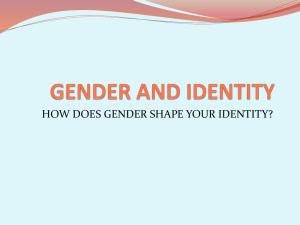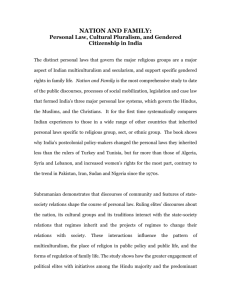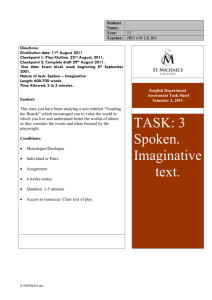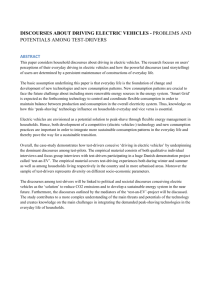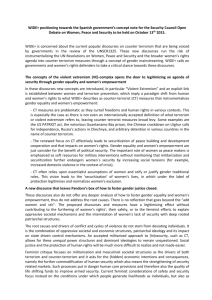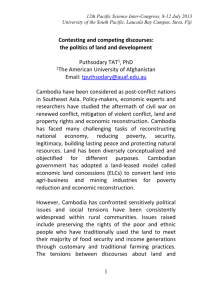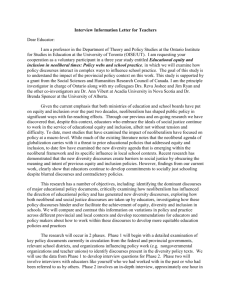Language, gender and inequalities
advertisement
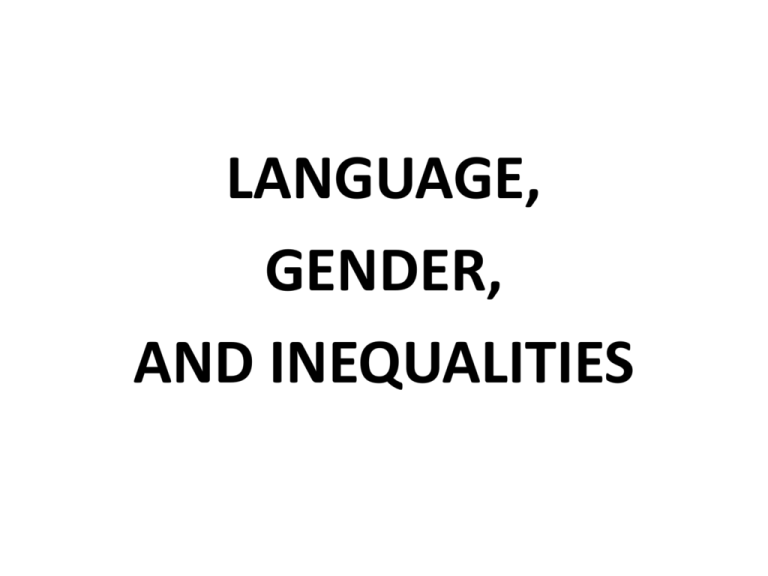
LANGUAGE, GENDER, AND INEQUALITIES GLOBAL INEQUALITIES 1. GLOBAL WEALTH • The 80 richest individuals in the world own as much wealth as 50% of the worlds population, according to OXFAM, and this is getting worse • By 2016 OXFAM predicts that the richest 1% in the world will have more wealth than the remaining 99%. 2. UK • The 100 richest individuals in the UK have the same wealth as 30% of all UK households. GENDER INEQUALITIES Gender inequalities - less in the news 1 2 3 4 5 6 7 8 9 10 Bill Gates $76 USA ✓ Tech Carlos Slim Helu $72 Mexico✓ Telecom Amancio Ortega $64 Spain ✓ Retail Warren Buffett $58 USA ✓ Finance Larry Ellison $48 USA ✓ Tech Charles Koch $40 USA Diversified David Koch $40 USA Diversified Sheldon Adelson $38 USA ✓ Entertainm’t Christy Walton$37 USA Retail Jim Walton $35 USA Retail THE GENDER GAP • The World Economic Forum publishes an annual Global Gender Gap Report that ranks countries by their gender performance. • Iceland, Finland, Norway and Sweden are ranked the best countries for gender equality. • Since 2006 the UK has dropped from 9th to 26th place globally in terms of gender equality. GENDER INEQUALITIES In the UK today: • who looks after children? who does the housework? [women still undertake two-thirds of unpaid work in home] • who gets the top jobs? [the majority - 70% - of the top 10% of earners are men] • who earns the least? [the majority – 62% - of workers paid less than the living wage are women] • who gets to represent us in Parliament? [77% of MPs are male – UK comes 64th in world rankings] • how many FTSE bosses are women? [only 5 of the top 100 FTSE bosses are women] • what about newspaper editors? [only 1 female editor of a national paper] THE ROLE OF LANGUAGE FOCUS TODAY: What part does language play in creating and maintaining gender inequalities? THE ROLE OF LANGUAGE 3 different areas where I would argue that language plays a major part in sustaining inequalities between women and men: 1. talk in the workplace/classroom/family – do male speakers dominate? 2. dominant discourses of masculinity and femininity 3. the English language itself – does it encode sexism? CONVERSATIONAL DOMINANCE • ‘Conversational dominance’ is the phrase used to refer to the phenomenon of a speaker dominating others in interaction. • Research focusing on mixed talk in a variety of social contexts has revealed asymmetrical patterns, with men's greater usage of certain strategies being associated with male dominance in conversation. CONVERSATIONAL DOMINANCE STRATEGIES: • Interruptions (grabbing the floor) • Talking too much (hogging the floor) • Non-cooperation SOME EXAMPLES – INTERRUPTIONS 2. ANNA: wild rice is nice/ you’ve never tasted it [so ((xx)) BILL: [well the Indians don’t eat it so why the bloody hell should you? 3. PETER:what has your section done in this area for instance? JUDITH: well we have begun thinking about it/ we've been holding regular review JUDITH: [sessions onPETER: [it'll take a lot more than that I can tell you/ this is a serious matter/ [from Holmes 1995:51] MORE EXAMPLES (4) Male: the way he starts the meeting is he comes in and he blathers for about two minutes in Irish, err Scots Gaelic, and then he turns round and says to them 'do you repeat?' = Female 1: =mhm Male: err and then asks "what is that?", err, and then somebody will say 'Irish' and he'll say 'oh very clever' and then go on from that = Female 1: =mhm Male: so you won't have missed much= Female 1: =no (Woods 1989: 155-6) (5) Mary: I’ve got this all figured out (3) I talked to Doyle today? (4) and (4) you know explained to him the fact that you know, come April I’ll probably have to (1) ahm (.) Bud: Excuse me, open the back door, I’m gonna give this to ((the dogs)) (8) Mary: I’ll probably have to terminate my appointment [DeFrancisco 2011: 157] CONVERSATIONAL DOMINANCE Research on conversational dominance: • in the classroom (e.g. Swann 2011) • at the doctor’s (e.g. West 1990) • in police stations (e.g. Ostermann 2003) • in law courts (e.g. Ehrlich 2006) • in Parliament (e.g. Shaw 2006) • in the workplace (e.g. Holmes 2006; Mullany 2007) • in internet chat rooms (e.g. Herring et al 2011) • in the home – heterosexual couples (e.g. De Francisco 2011); families at mealtimes (e.g. Ochs & Taylor 1995) SUMMARY ‘Women still struggle for acceptance within institutional settings such as government, politics, law, education, the church, the media and the business world.’ (Judith Baxter ‘Introduction’ in Speaking Out: The Female Voice in Public Contexts, 2006: xiv) THE ROLE OF LANGUAGE 3 areas where language plays a major part in sustaining inequalities between women and men: 1. tendency for male speakers to dominate in talk in the workplace/classroom/family etc. 2. dominant discourses of masculinity and femininity 3. the English language itself – does it encode sexism? DISCOURSE Idea of ‘a language’ a useful fiction – no such thing as ‘the English language’ – instead, what we refer to as ‘the English language’ is more accurately a heterogeneous collection of competing discourses. A discourse can be defined as ‘a way of speaking associated with a particular worldview’, for example: • conservative (with a small <c>) • feminist COMPETING DISCOURSES • Different discourses position us in different ways in relation to the world. • Dominant discourses have a key role to play in reproducing everyday taken-for-granted norms. • Gender an area where different discourses compete – dominant discourses of masculinity and femininity vie with alternative discourses of masculinity and femininity. DISCOURSES OF MASCULINITY HEGEMONIC MASCULINITY Dominant discourses of masculinity position boys and men as: • strong • brave • active • heroic • successful • competitive • technologically able HEGEMONIC MASCULINITY (6) [Julian tells a story of a sporting triumph] so I took it on the half-volley, and it just went flying, […] and it was just the most beautiful ball I've ever ever ever seen <EMPHATIC> (7) [Rob tells his friends about a fight at work] what he did was he threw this knife at me, this is honest truth, threw a knife at me, and then- and there was this cable […] he fucking chased me with it, and I thought "Fuck this", and he kept like having a go and teasing me, and I just smashed him straight round the face with a bell box in front of the boss (8) [Michael tells Bill about buying wine in Cornwall] we went to an inn in Cornwall which had a most impressive display of bottles on the wall [mhm] so we had a meal there and got chatting to the owner cos I thought his wine was very good […] so er- paradoxically I’ve ordered four cases of wine from Cornwall ALTERNATIVE MASCULINITIES (9) [four men friends in a flat in Manchester talking about a friend whose girlfriend had been unfaithful] Dave: fucking 'ell, harsh that… Chaz: bit harsh that, innit? Dave: yeah, it's a bit heavy innit? George: blues big time Ewan: I'd be fucking gutted… [Gough & Edwards 1998: 419] ALTERNATIVE MASCULINITIES TONY: I think it's because I decided that- . that (1.0) I ((really)) didn't like this way of relating to people very much and that . life actually would be . improved by . people being more open with each other . not that I'm . brilliant at it <QUIET LAUGH> PETE: makes you vulnerable though don't you think? . um don't- don't you feel vulnerable? . sometimes? TONY: yeah but . I suppose that . that's a useful reminder really isn't it ((I mean)) vulnerability is er- (1.0) all the- all the- the- the masks and so on are supposed to keep vulnerability at bay but . .hh they only do this at a very high cost DISCOURSES OF FEMININITY Dominant discourses of femininity position women and girls as: • caring • sensitive • emotional • cooperative • passive • gentle • weak • concerned about appearance (11) [Sarah tries on some of Gwen's make-up] GWEN: doesn't she look really nice? KATE: yes EMILY: she DOES look nice KATE: you should wear make-up more often . Sarah (12) [topic = new sundress] KAREN: you’ll look at yourself in the mirror and you’ll think “God I look fat” (13) [Anna arrives from work late and explains why she is upset] ANNA: I just had such a bad week and then my boss just stood in the office tonight and told me and his deputy that we're both crap managers basically [SUE: oh/ LIZ: oh god/ ] (…) I get so angry at myself for crying/ COMPETING DISCOURSES OF FEMININITY (14) [topic = end of term school plays] KAREN: PAT: KAREN: PAT: did Peter do his song? yes/ was he good? he was marvellous/ he was marvellous/ every kid in it was marvellous/ KAREN: oh they- I think they always are/ COMPETING DISCOURSES OF FEMININITY (15) [3 women friends have been talking about a family they all know with ‘ghastly children’] LIZ: I think it's a- . a fallacy as well that you like every child/ SUE: mhm/ LIZ: cos you don't/ ANNA: no/ . that's right/ SUE: I still quite often don't like children/ <LAUGHS> ANNA: <LAUGHS> LIZ: actually I think you particularly dislike your own/ IMPACT OF DOMINANT DISCOURSES OF GENDER • pressure on boys to be brave; strong; heroic; active; not emotional; etc. • pressure on girls to be gentle; caring; sensitive; “nice”; weak; etc. • difficult to challenge or resist the dominant discourses: boys get accused of being ‘gay’; girls get told off for being ‘unladylike’. THE ROLE OF LANGUAGE 3 areas where language plays a major part in sustaining inequalities between women and men: 1. tendency for male speakers to dominate in talk in the workplace/classroom/family etc. 2. dominant discourses of masculinity and femininity 3. the English language itself – does it encode sexism? IS THE ENGLISH LANGUAGE SEXIST? • Every language is different and each language encodes the world around it depending on what is seen as important by society. • But in a non-sexist language we would expect to find symmetry in the lexicon for sex and gender. • So we find lexical sets such as: sheep-ewe-ram-lamb; or horse–mare–stallion-foal. • BUT for human beings?? ASYMMETRY IN THE LEXICON 1. 2. 3. 4. 5. man vs. woman – lady – girl Mr. vs. Mrs. – Miss – Ms. bloke – guy – fellow – chap – dude etc. slag – slut - cow – whore etc. effeminate; virile; emasculate. THE PRONOUN ‘HE’ Ideas of Correctness - legacy of 18th century prescriptivism Debate over 3rd person singular gender-neutral pronoun: i) Somebody knocked at the door but they had gone when I got downstairs. ii) Somebody knocked at the door but he had gone when I got downstairs. iii) Somebody knocked at the door, but he or she had gone when I got downstairs. Singular THEY • “Eche of them sholde … make theymselfe redy.” Caxton, Sonnes of Aymon (c. 1489) • ‘If a person is born of a … gloomy temper … they cannot help it.’ Lord Chesterfield Letter to his Son (1759). • “I would have every body marry if they can do it properly.” Jane Austen Mansfield Park (1814). CONFUSED USAGE Homework for a 6 year old child [Source: Guardian G2 24/02/14] Find out about an inventor. • Who was he? • How old were they when they began inventing? • Did they have a wife and family? MAN as a false generic ‘Man’ was the Anglo-Saxon word for ‘person’, as distinct from ‘wif-mann’ and ‘wer-mann’. Modern word ‘man’ ambiguous: - the rich cannot appreciate the impact of inflation on the average working man. - the average working man earns almost twice as much as the average working woman. February 2015, BBC Radio 4, announcement of the discovery of “the strongest material known to man”. SEXIST MORPHOLOGY? waiter manager governor actor steward host god duke - waitress manageress governess actress stewardess hostess goddess duchess ‘Being called a “poetess” brings out the terroristress in me’ (Adrienne Rich) (see also nouns ending –ette: e.g. usherette; majorette; suffragette; leatherette; kitchenette) SEMANTIC DETERIORATION Muriel Schulz (1975: 65): ‘ Again and again in the history of the language, one finds that a perfectly innocent term designating girls or women may begin with totally neutral or even positive connotations, but that gradually it acquires negative implications…’. COMPARE these pairs of words: • master - mistress • bachelor - spinster • Lord – Lady • buddy – sissy ANDROCENTRISM DEFINITION of androcentrism: • centred on, emphasizing or dominated by males or masculine interests. [literally means ‘male-centred’ from Greek andros = male human being] • If a society is androcentric, then inevitably the language will reflect and reproduce that. • opposite of androcentrism is gynocentrism. FEMINIST REFORMS • • • • • Ms. chairwoman/chairperson/chair firefighter; police officer sexism; sexual harassment; sisterhood s/he; singular ‘they’ FEMINIST DICTIONARIES 1. Cheris Kramarae & Paula Treichler Amazons, Bluestockings and Crones: A Feminist Dictionary (Pandora Press: 1992) 2. Mary Daly Webster's Intergalactic Wickedary of the English Language (Women’s Press: 1988). 3. Jane Mills Woman Words. A Vocabulary of Culture and Patriarchal Society (Longman: 1989). ‘It is clear to me that until very recently dictionary definitions largely reflected male rather than female experience and language-use.’ IN CONCLUSION … Language is implicated in the continuing inequalities between women and men: (i) tendency for male speakers to dominate in mixed-sex talk; ii) speakers are positioned by dominant discourses of masculinity and femininity; iii) the English language itself is androcentric. FEMINIST DICTIONARIES Mary Daly Webster's Intergalactic Wickedary of the English Language (Women’s Press: 1988). Invented words such as ‘gyn-affection’ and ‘gyn-ecology’. Played with words like CRONE (e.g. chronology; synCRONE-icities) and HAG (e.g. hagography = ‘the history of women who are on the Journey of radical be-ing’). 3. Jane Mills Woman Words. A Vocabulary of Culture and Patriarchal Society (Longman: 1989). ‘It is clear to me that until very recently dictionary definitions largely reflected male rather than female experience and language-use.’ FEMINIST DICTIONARIES 1. Kramarae & Treichler A Feminist Dictionary (1985) ‘Dictionary’: ‘Women’s dictionaries … offer more than an alternative lexicon; they call attention to the ways language functions in the world’. ‘spinster’: ‘figures of fun and ridicule to those men who see themselves as essential to a woman’s existence’. ‘fat’: ‘When used to describe adult women, is an ultimate pejorative, meaning that they are larger than fashion dictates they ought to be, and implying they are undisciplined, lazy, out of control …’ ‘sisterhood’ – one definition is ‘A discovery of shared oppression’. SUBVERSIVE FICTION Suzette Haden Elgin Native Tongue (1985) Explores the creation of a new gynocentric language in a future world where ‘The male reigns supreme, the women’s movement is crushed and women are barred from all power’. See wonderful appendix with examples such as: radiidin = non-holiday (such as christmas). ralorolo = non-thunder, much talk and commotion from one with no real knowledge of what they’re talking about. rarilh – to deliberately refrain from recording; for example, the failure throughout history to record the accomplishments of women. [NB ra- is a negative prefix] SEMANTIC DETERIORATION Muriel Schulz (1975: 65); ‘ Again and again in the history of the language, one finds that a perfectly innocent term designating girls or women may begin with totally neutral or even positive connotations, but that gradually it acquires negative implications…’. hussy = housewife ‘a lewd woman or prostitute’ harridan = ‘worn out horse’ a disagreeable old woman a decayed strumpet wench: OE wencel = child, servant ME wenche = girl, young woman end of 13th C = wanton/lewd woman hag = witch ugly old woman prostitute
